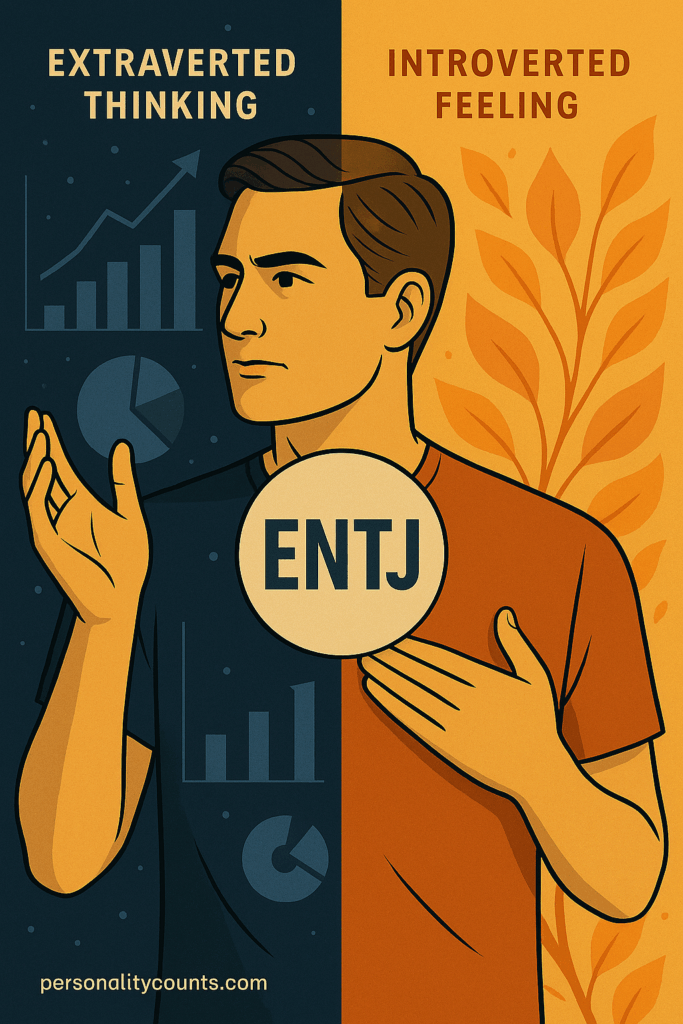
Understanding the Te–Fi Polarity in ENTJs
ENTJs are known as natural leaders: bold, decisive, and highly strategic. At the core of their personality is Extraverted Thinking (Te), which drives their ability to organize systems, achieve efficiency, and set ambitious goals. Te gives ENTJs their commanding presence, their focus on results, and their ability to marshal resources toward success.
But opposite Te lies their inferior function: Introverted Feeling (Fi). While Te focuses outward on measurable outcomes, Fi is deeply internal—concerned with authenticity, values, and personal alignment. For ENTJs, Fi often feels uncomfortable or underdeveloped, showing up unpredictably under stress.
This polarity defines much of the ENTJ experience: the clash between external achievement and inner values. When balanced, it creates powerful, value-driven leadership. When unbalanced, ENTJs may pursue success at the expense of authenticity—or collapse into Fi grip episodes of self-doubt and hypersensitivity.
In Relationships
Relationships are where ENTJs most clearly wrestle with their Te–Fi polarity. Te drives them to be direct, pragmatic, and solutions-oriented in communication. They want to fix problems quickly and lead decisively.
Fi, however, reminds them that not every issue is solved with logic or structure. Sometimes, partners need empathy, authenticity, and space to express emotions without being “fixed.”
Example: An ENTJ may respond to a partner’s stress by creating a plan to solve the problem (Te) while the partner simply wanted to feel heard (Fi). Learning to honor both sides—solving when appropriate and empathizing when needed—strengthens bonds.
In Careers
Professionally, ENTJs thrive when leaning on Te. They excel at creating systems, optimizing processes, and setting ambitious targets. They often rise into leadership roles because they naturally take charge and push for results.
Fi, however, plays a quieter but equally important role. Without Fi, ENTJs risk becoming overly focused on profit, efficiency, or power, neglecting whether their work aligns with their deeper values. When Fi is ignored, ENTJs may experience burnout or dissatisfaction, even at the height of external success.
Example: An ENTJ executive may drive a company to record profits (Te) but later feel an inner emptiness if the work doesn’t align with personal values (Fi). Integrating Fi ensures their success feels meaningful.
In Hobbies
Hobbies offer ENTJs a safe space to explore their Fi side. Te may push them toward structured, achievement-oriented activities—competitive sports, leadership roles in clubs, or skill-building.
But Fi nudges them toward more reflective or expressive outlets: writing, art, music, or volunteering for causes that align with personal values. When ENTJs allow both sides to coexist, they discover hobbies that not only challenge them but also ground them emotionally.
When Depressed
Depression in ENTJs often takes the form of an Fi grip. Instead of their usual commanding presence, they feel withdrawn, hypersensitive, and uncharacteristically self-critical. They may fixate on past mistakes, feel like failures, or doubt whether their achievements have any real value.
In this state, Fi overwhelms Te, leaving them without the drive or clarity they normally rely on. Recognizing this shift as part of their Te–Fi polarity helps ENTJs avoid mistaking it for weakness and instead see it as a signal to realign with their values.
When Stressed
Stress typically brings Fi to the surface in raw and uncomfortable ways. ENTJs who normally pride themselves on logic may suddenly lash out emotionally, cry unexpectedly, or feel paralyzed by self-doubt. They may also become more defensive, hypersensitive to criticism, or over-focused on whether others see them as “good” or “authentic.”
Example: An ENTJ leading a major project may handle challenges with ease until a personal value is threatened—suddenly they feel overwhelmed, emotional, and unlike themselves. Understanding this is Fi surfacing allows them to rebalance instead of spiraling.
Handling Conflict
Conflict often brings Te dominance to the forefront. ENTJs approach disagreements with structure, logic, and directness. They want to solve the problem and move on.
But ignoring Fi in conflict makes them seem harsh or insensitive. To others, it can feel like they’re bulldozing emotions with facts. By acknowledging Fi—taking time to recognize how values and feelings shape the disagreement—ENTJs become not only effective but also compassionate leaders in conflict resolution.
Blind Spot Challenge: Introverted Sensing (Si)
In addition to their Te–Fi polarity, ENTJs also have a blind spot around Introverted Sensing (Si). This shows up in how they sometimes dismiss the importance of details, traditions, or gradual learning.
Signs of this blind spot include:
- Neglecting health routines or physical well-being until exhaustion hits
- Overlooking past lessons and repeating avoidable mistakes
- Growing impatient with routine processes or step-by-step planning
- Struggling to rest, instead pushing forward relentlessly
Strengthening Si doesn’t mean abandoning their bold Te energy. It means creating sustainable routines, respecting lessons from the past, and building resilience through consistency. This reduces burnout and helps ENTJs achieve long-term success without collapsing.
Real-Life and Fictional Examples
- Real-Life: Many ENTJ leaders, from entrepreneurs to politicians, show how Te drives their ambition. Yet those who neglect Fi often face criticism for lacking empathy or moral grounding. Leaders who integrate Fi—aligning their power with authentic values—are remembered more positively.
- Fictional: In Game of Thrones, Tywin Lannister reflects Te without Fi, pursuing power at all costs. In contrast, a character like Jean-Luc Picard in Star Trek shows a healthier Te–Fi balance, pairing decisive leadership with integrity and values.
Practical Ways for ENTJs to Balance Te and Fi
- Reflect regularly on whether goals align with personal values
- Practice active listening in relationships instead of jumping straight to solutions
- Explore creative outlets like journaling or art to express inner values
- Build self-care and rest into routines to reduce Si blind spot issues
- Consider mentorship or therapy as spaces to explore Fi more deeply
FAQ: ENTJ Te–Fi Polarity
Q: Why do ENTJs struggle with Fi?
A: Fi is their inferior function. ENTJs rely heavily on Te, making Fi underdeveloped and uncomfortable. It tends to surface unpredictably under stress.
Q: What does an Fi grip look like for ENTJs?
A: They may become hypersensitive, self-critical, withdrawn, or paralyzed by doubts about their worth or authenticity.
Q: How can ENTJs develop Fi?
A: Through reflection, journaling, therapy, or exploring values-driven hobbies. Developing Fi ensures that success feels meaningful, not hollow.
Q: What about their blind spot?
A: ENTJs often ignore Si, leading to neglect of health, routines, or past lessons. Building small habits and respecting consistency helps balance this blind spot.
Final Thoughts
The polarity between Extraverted Thinking and Introverted Feeling defines much of the ENTJ personality. Te gives them drive, structure, and command, but Fi reminds them of the importance of authenticity and inner alignment. Neglecting Fi leaves ENTJs hollow; overindulging in Fi makes them lose their edge.
By learning to balance Te with Fi—and by addressing their Si blind spot—ENTJs become not only powerful achievers but also grounded, authentic leaders.
